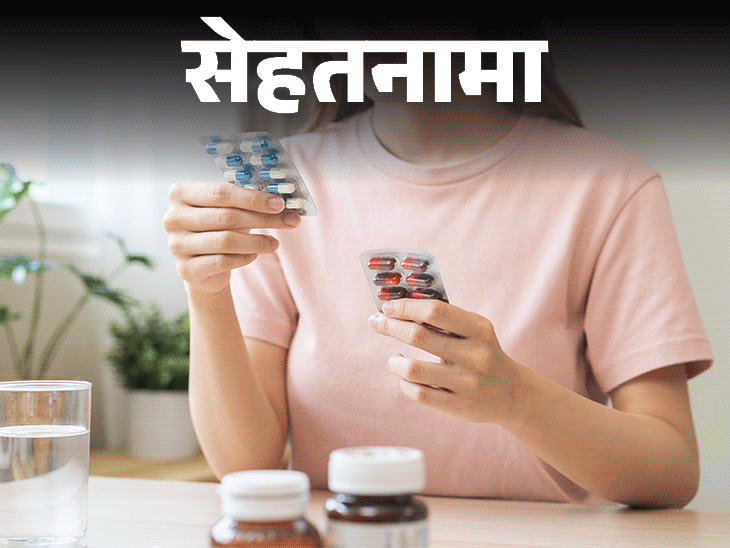15 minutes agoAuthor: Gaurav Tiwari
- copy link

When we have a headache, we take aspirin. If there is pain in the muscles, we take paracetamol. Similarly, in case of stomach or toothache, one buys pain killer from a medical store and consumes it. This also provides immediate relief. This is why painkillers are one of the most commonly used over-the-counter medications in the entire world.
The more commonly we use painkillers, the more dangerous their side effects are. These medicines can especially seriously affect our stomach and kidneys. Their excessive or improper use can cause stomach ulcers, liver damage and kidney damage.
According to a study published in the National Library of Medicine in July, 2021, consuming too many painkillers or consuming them for a long time increases the risk of liver and kidney damage. It even increases the risk of heart diseases.
so today ‘medical certificate‘I will talk about the side effects of painkillers. You will also learn that-
- How big is the market for painkillers?
- What are painkillers and how do they work?
- Why is kidney health deteriorating due to this?
The market of painkillers is increasing every day
According to ‘Market Research Future’, a global research company on every type of market in the world, the painkillers market is one of the fastest growing markets in the world. Based on the rapid increase in their demand in the last few years, it is estimated that their market can grow at a compound growth rate of 7.2% between the year 2024 and 2032.
The market of painkillers in India is growing faster than the rest of the world. It is estimated that it may grow at a compound growth rate of 9.21% between 2024 and 2029.

What are painkillers?
In medical language, painkillers are called analgesics. These are medicines that help in controlling pain and reducing fever. There are some medicines which can reduce swelling. These are mainly divided into two categories-
- Nonsteroidal anti-inflammatory drugs (NSAIDs)
- Opioids
How do these medicines work?
- NSAIDs reduce inflammation and block signals that make the body feel pain. Therefore, after eating these, the feeling of pain stops.
- Opioids directly control the nervous system. These block brain receptors. Due to this, the message that there is pain in any part of the body does not reach the brain. Therefore, after eating these, the feeling of pain stops.

What harm are painkillers causing to health?
Dr. Ganesh Srinivas says that first of all it is important for us to understand that no medicine is completely risk free. Since painkillers affect the entire body including our brain receptors and nervous system, their harm is also greater. Let us see in the graphic what side effects they can have.

Kidneys suffer the most damage
Dr. Ganesh Srinivas says that painkillers cause the most damage to the kidneys. This happens because painkillers reduce blood flow to the kidneys. Due to this the functioning of the kidneys is affected. Apart from this, kidney tissues also get damaged. Ultimately, it is the job of the kidneys to filter these medicines and remove them from the body. Even during that time these medicines affect the kidneys. This is the reason why consuming too many painkillers increases the risk of kidney damage.
5% cases of kidney failure due to pain killers
According to the American National Kidney Foundation, improper use of painkillers can cause problems throughout the body, including the kidneys. Every year 3% to 5% of new cases of chronic kidney failure are caused by excessive use of these painkillers. Once someone has kidney disease, continued use of these medicines makes the condition worse.
Painkillers are not the enemy
Dr. Ganesh Srinivas says that painkillers are made to reduce our pain and provide relief. If these are consumed carefully as per the doctor’s prescription, the harm caused by them can be reduced.
Side effects of painkillers can be reduced by following these instructions given by Dr. Ganesh Srinivas:
Follow dosage instructions: If you are taking pain killers, always follow the prescribed or recommended dosage. If you have persistent pain problem, consult a doctor instead of taking medicines on your own.
Use as little as possible: Use painkillers as little as possible. If pain persists, consult a doctor and get the underlying problem treated.
Find alternatives to: Depending on the cause of pain, there may be several options to reduce it. There is no need to take any kind of medicine in this. Things like physical therapy, acupuncture, or mindfulness can provide relief from moderate pain.
Get regular checkups: If you take painkillers regularly due to any medical or physical condition, then keep getting your stomach and kidneys checked regularly. This will reveal how much these medicines are affecting the kidneys and stomach. According to that, the doctor can change their dosage.
Stay away from alcohol: If someone is drinking alcohol along with painkillers, it can increase the risk of stomach ulcers and kidney damage. This also increases the risk of liver damage. Therefore, stay away from alcohol during this period.
………………………….. Also read this health related news Sehatnama- Effect of antibiotics is decreasing: 30 Crores of people are at risk, WHO warns – do not take medicines on your own.

A recent study by WHO has revealed that during the Covid pandemic, people were given so many antibiotics that antimicrobial and antibiotic resistance has increased further. Read the full news…



